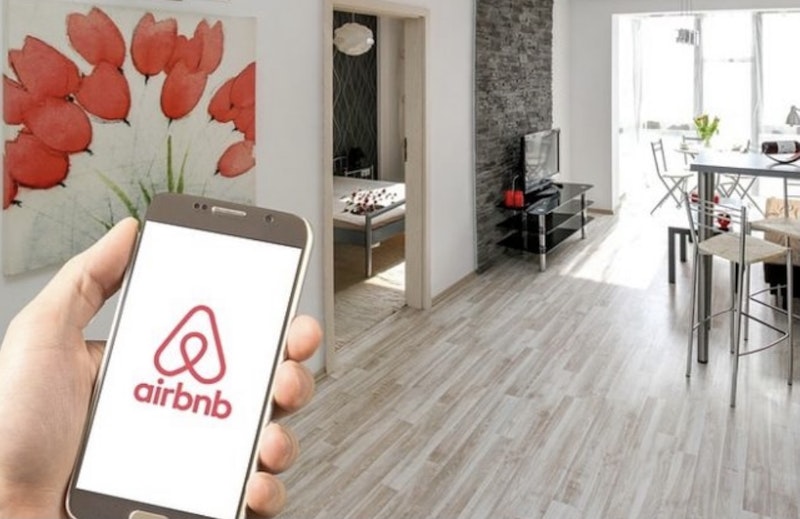The American real estate market is frenzied, so investors have turned to a new strategy: buying homes like crazy to rent out on Airbnb. If you're a strict, laissez-faire capitalist who says the market always works best at allocating goods and services, think again, as this development highlights two major instances where capitalism is harming the public. For example, the fact that hedge funds are allowed to buy private homes, and the ability of Airbnb to drive up prices on the rental market, leading to hardship and even homelessness.
The American government is faced with a clear choice. Does it want to protect people from investors who care nothing about their housing situation, or will it protect the right of hedge fund fat cats to maximize their bottom line and brag about their returns?
Airbnb flatters itself by posing as a mainstay of “the sharing economy,” as does Mark Zuckerberg with his Facebook money machine. The leaders of such firms are always talking about wanting to "change the world," but the grandiosity of their vision fails to recognize the negative changes they spark. Hardcore capitalists like Zuckerberg don't share anything, but some like to pretend to so they won't be confused with Republicans, who at least are honest about their profit motivations. Wildly successful entrepreneurs who want to be considered liberals try to pass themselves off as "revolutionaries" because they're embarrassed to think of themselves as mere capitalists, which they are. Twitter’s Jack Dorsey practices "Vipassana" at Indian ashrams and grows a Rasputin beard in the hope that he'll be seen as a visionary instead of the businessman tycoon that he is.
I've stayed at many hotels and motels, and have only been disgusted at their conditions in China when I was on a four-month backpacking trip that began in Yokohama and ended in southern Turkey. I've stayed at one Airbnb, and it was a dump. It was in northern, rural New York State, and there were few alternatives. The owners, conveniently, never showed up. I wouldn't have either. I got excited when I saw a few movie DVD cases in the living room, but there were no discs inside.
A friend of mine was in Paris a few years ago, and the woman renting him a room via Airbnb put him out on the street after midnight because her boyfriend suddenly decided to return. While I may be biased against Airbnb for personal reasons, I don't like what I see the firm doing to people's lives just so tourists can visit for a few days. There are areas now where it's nearly impossible to obtain a long-term lease because so many apartments now rent by the night. These day-tripping visitors add nothing to the neighborhood, other than the rent increases they contribute to.
And we're now seeing institutional investors getting in on the action. But the wave of corporate purchases of single houses goes beyond the opportunities presented by Airbnb. The median price of an American house has increased by 28 percent over the last two years. The pandemic and changing demographics are contributing to this, but the fact that institutional investors snapped up 15 percent of U.S. homes for sale in the first quarter of this year is also a major factor. In April, according to The Wall Street Journal, one of these firms won a bidding war to purchase an entire neighborhood of single-family homes in Conroe, Texas.
One of the reasons to worry about this trend picking up steam is the low interest rates available to institutional investors. Invitation Homes, a $21 billion spinoff of Blackstone, the world’s largest private equity company, gets billion-dollar loans at interest rates around 1.4 percent, whereas regular home buyers pay between two and four percent for mortgages. The firm, which operates in 16 cities, can use the savings to outbid other buyers, driving up the cost of single homes. Its offers are almost always all cash, another major advantage in competitive markets.
ReAlpha, a Dublin, Ohio firm, is planning to buy up to $1.5 billion in homes in an attempt to become the nation's largest owner of short-term rental property. "In the next few years, we hope to be the largest owner of Airbnb properties," said ReAlpha Chief Executive Officer Giri Devanur. "There are 660,000 U.S. properties on Airbnb. There's no clear leader." Does that sound like the sharing economy? Similar firms across the nation will be snatching up homes to house tourists. ReAlpha execs talk about how the short-term rental market is heating up, but the flipside to that boom is the accompanying decline in housing supply for local people who actually need housing, as opposed to those passing through.
The U.S. already had a housing crisis before Airbnb and institutional investors decided to tamper with it. Some property owners have evicted long-term renters to go with Airbnb. Some cities have responded with legislation. San Francisco did the right thing by mandating that only full-time residents can list their units with Airbnb. Every city should do this. New legislation is also needed to curb the ambitions of private equity firms, as those ambitions come at the expense of the quality of life in this country.
The housing sector is too crucial to people's lives to subject it to the greedy whims of Wall St. hotshots. Institutional investors shouldn’t be allowed to buy private homes. In the housing market, capitalism is failing the citizens. Government intervention is the only solution.

